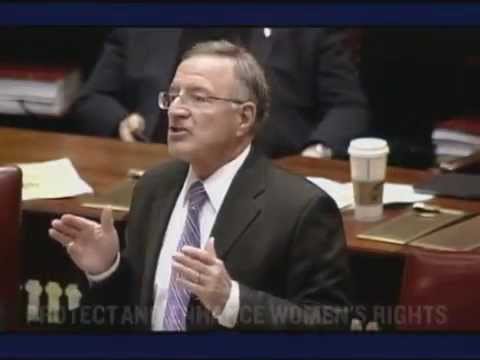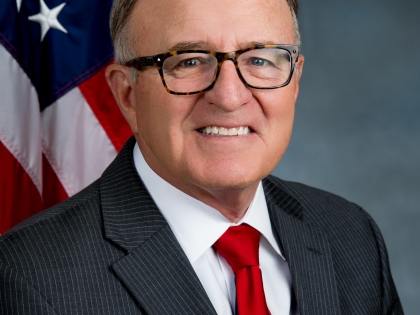
SENATORS CALL FOR SENSIBLE WORKERS’ COMP REFORM IN BUDGET
March 22, 2017
-
ISSUE:
- Workers' Compensation
- business
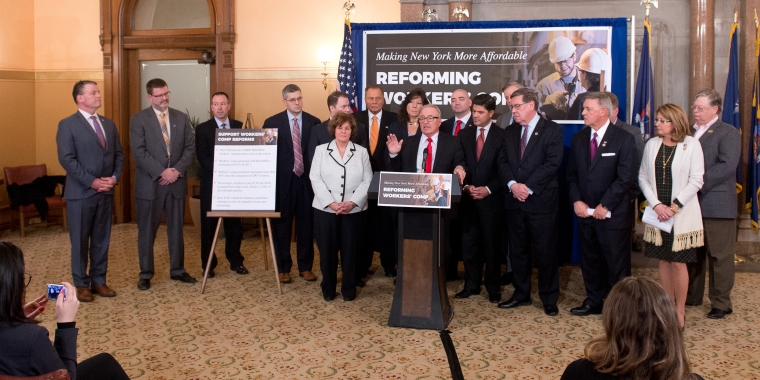
Senators George Amedore, John DeFrancisco, and Fred Akshar and members of the Senate Majority Conference today (3/22/17) called for the state budget to include meaningful workers’ comp reforms that would achieve significant costs savings for municipalities, school districts and businesses, while continuing to protect injured workers. They were joined at a Capitol press conference by municipal leaders, business groups and school superintendents that support the inclusion of workers’ comp reform measures in this year’s enacted budget, expected to be adopted by March 31st, 2017.
“When we talk about making New York more affordable, workers’ comp reform needs to be part of the conversation. We pay the third highest rates in the nation, and costs continue to skyrocket each year. That means every school district, every municipality, every not-for-profit, and every business in this state is struggling to keep up with increases that have become simply unsustainable. We have advanced several proposals in our one-house budget resolution that would achieve significant savings and at the same time, ensure fairness and protections to injured workers,” said Senator George Amedore.
"New York's highest in the nation workers' compensation costs don't just negatively affect businesses and our economy - but schools, municipalities, nonprofits and the state itself," said Senator Fred Akshar. "We're working hard to bring everyone to the table and talk about ways to make our workers' compensation system more efficient and less expensive - without compromising benefits for injured workers."
“The rising cost of worker's compensation insurance continues to increase the cost of doing business within New York State. We must address this issue to retain and attract employers to grow our economy,” said Senator DeFrancisco.
“Employers, small and large, continue to struggle with the high cost burden of worker’s compensation cost. It is the number one or two concern in their business. Unfortunately, due to the complexity of workers’ compensation and reforms implemented decades ago I feel we have lost our focus when it comes to the injured worker. For those who are seriously injured and impaired, we want to make sure that they have access to care and receive appropriate consideration. For those who are able and willing to return to work we need to provide greater care to expedite their return to work. Unfortunately, the actions in the past have moved away from the attention to the worker and instead, to the system. We need to get back to our original mission – take care of the injured worker so that they can get back to work!” said Assemblymember John T. McDonald III
New York pays the third highest workers’ compensation rates in the nation, contributing to a less competitive business climate and placing an additional burden on struggling municipalities, school districts, and not-for-profits.
The Senate Majority conference has made workers’ comp reforms a priority in this year’s budget process, advancing a number of sensible reforms to make it more affordable to do business in New York, as well as provide significant mandate relief to municipalities and school districts that will benefit property taxpayers. The proposed changes include updates to duration caps and schedule loss of use awards and changes to reduce frictional costs, streamline forms, improve independent medical examinations and require implementation of a prescription drug formulary by December 31st of this year.
The Senate budget resolution also included several measures to ensure fairness and offer protections to injured workers including: ensuring prompt access to quality medical care and lost wage benefits, enhanced incentives for workplace safety programs, and implementation of a more efficient hearing process.
“Coxsackie-Athens School District has seen large increases in our workers’ compensation premiums the last several years. The increases this year account for one position in our district. We want what is fair for our employees and our taxpayers. Reform is needed to make it a fair system for both,” said Randy Squier, Superintendent, Coxsackie-Athens School District.
“With local governments challenged to comply with the tax cap, reforms leading to workers returning to work and premium cost relief would be a double win for local taxpayers,” said Town of Ulster Supervisor Jim Quigley.
“Momentum is building and we’re making real progress toward including meaningful and significant workers’ comp reform in this year’s budget,” said Heather C. Briccetti, Esq., president and CEO of The Business Council of New York State, Inc. “On behalf of our members, who have made workers’ comp reform their number one issue this legislative session, we want to thank Senators DeFrancisco, Amedore and Akshar for pushing this issue to the forefront. We also commend Leader Flanagan for including reform language in the Senate’s one-house budget resolution and repeatedly stating his support of the issue. The workers’ comp system costs our state’s employers more than $10 billion per year and prevents them from investing in their businesses and hiring more workers. We must fix this crisis and we need to do it now.”
“Small businesses in New York have long been critical of the dramatic increase in workers’ compensation costs,” said Mike Durant, NFIB/NY State Director. “Implementing meaningful reform will modernize our compensation system, boost our economy, and continue to rightfully compensate injured workers. We applaud the Senate Majority for making workers’ compensation reform a budget priority and strongly encourage lawmakers in both houses to join this effort.”
"We thank members of the Senate Republican Conference for advancing sensible reforms to New York's Workers' Compensation system. Upstate’s small businesses, large employers, not-for-profits, municipalities and school districts pay, on average, the third highest Workers’ Compensation premiums in the nation. Our economy can't reach its full potential when costly programs prevent employers from creating jobs and expanding their business. Our communities will not thrive as long as local governments continue to pass the high costs of this and other programs onto taxpayers. We can’t afford to wait another 10 years to reform this antiquated and costly program. Now is the time to reform the Workers' Compensation program in a way that reduces costs while maintaining protection for injured workers. Let's get to work," said Greg Biryla, Executive Director of Unshackle Upstate.
"If we're truly serious about keeping jobs and businesses here in New York, then a first and critical step must be addressing workers' compensation," said State Senator Rob Ortt (R,C,I - North Tonawanda). "Not only is the status quo not helping workers, it's strangling our small businesses, school districts, and local governments. As a former mayor, I can attest to the swelling and unsustainable costs that workers comp places on employers. That's why I so strongly believe that reforming our inadequate workers' compensation system must be a priority in this year's budget negotiations."
Senator Sue Serino (R,C,I--Hyde Park) said, "Workers comp reform needs to be a priority in this year's budget for one simple reason--it directly translates to increased affordability for all of New York's taxpayers. Not only would it significantly reduce the cost of doing business here, paving the way for job creation and economic development, it would result in significant cost savings for cash-strapped localities and school districts. I urge my colleagues in both houses to include commonsense reform in this year's budget that strikes a balance between protecting workers and bolstering New York's businesses and communities."
Senator Terrence Murphy said, "Now is the opportune time to re-evaluate how we care for employees injured on the job. We must continue to implement effective measures to improve the business climate and bring down the cost of workers' compensation without dropping the burden on taxpayer's shoulders."
###
Share this Article or Press Release
Newsroom
Go to NewsroomStaff Analysis of the FY 2016 Executive Budget - White Book
January 29, 2015
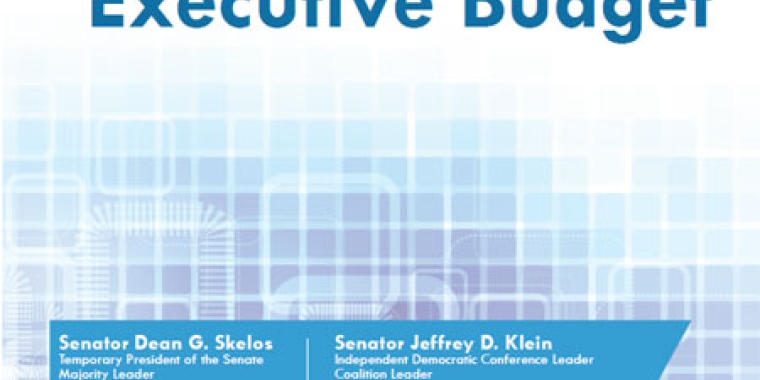
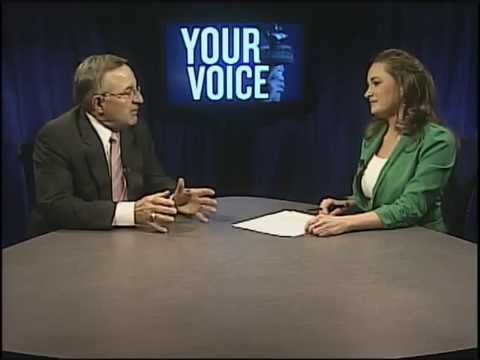
2015 Joint Legislative Hearing Schedule
January 23, 2015
